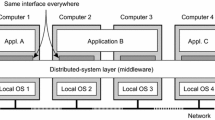Abstract
A cooperative platform called Cova is presented, which aims to uniformly model a wide range of cooperation scenarios and to reduce the groupware design and development work. To achieve these goals, Cova provides two facilities, namely a specification language for developers to describe various cooperation modes uniformly and a run-time system that provides some generalpurposed services guaranteeing the semantics specified. With these facilities, the developers can then concentrate on the application specific functions rather than the control mechanisms. Therefore, the development efficiency is promoted. This paper details the design and implementation issues of the platform including the model and the specification language, platform architecture, transaction management, service integration and so on. Application development with Cova platform is also covered.
Similar content being viewed by others
References
Ellis C, Gibbs S, Rein G. Groupware: Some issues and experiences.Commun. ACM, 1991, 34(2): 38–58.
Ellis C, Wainer J. A conceptual model of groupware. InProc. ACM Conf. Computer Supported Cooperative Work, Smith J B, Smith F D, Malone T W (eds.), Chapel Hill: ACM, 1994, pp.79–88.
Guangxin Yang, Meilin Shi. Cova: A programming language for cooperative applications.Sci. China, Ser. F, 2001, 44(1): 73–80.
Li D, Muntz R. COCA: Collaborative objects coordination architecture. InProc. ACM Conf. Computer Supported Cooperative Work, Poltrock S, Grudin J (eds.), Seattle: ACM, 1998, pp.179–188.
Roseman M, Greenberg S. GroupKit: A groupware toolkit for building real-time conferencing applications. InProc. ACM Conf. Computer Supported Cooperative Work, Turner J (ed.), Toronto: ACM, 1992, pp.43–50.
Patterson J F, Hill R Det al. Rendezvous: An architecture for synchronous multi-user applications. InProc. ACM Conf. Computer Supported Cooperative Work, Halasz F (ed.), Los Angeles: ACM, 1990, pp.317–328.
Crowley T, Milazzo Pet al. MMConf: An infrastructure for building shared multimedia applications. InProc. ACM Conf. Computer Supported Cooperative Work, Halasz F (ed.), Los Angeles: ACM, 1990, pp.329–342.
Weber M, Partsch G, Hock Set al. Integrating synchronous multimedia collaboration into workflow management. InProc. Int. ACM SIGGROUP Conf. Supporting Group Work, Hayne S C, Prinz W (eds.), Phoenix: ACM, 1997, pp.281–290.
Guangxin Yang. A uniform meta-model for modeling integrated cooperation. InProc. ACM Symp. Applied Computing, Lamont G B, Haddad Het al. (eds.), Madrid: ACM, 2002, pp.322–328.
Gelernter D, Carriero N. Coordination languages and their significance.Commun. ACM, 1992, 35(2): 97–107.
Guangxin Yang, Meilin Shi. oodOPT: A semanticsbased concurrency control framework for fullyreplicated architecture.J. Comput. Sci. Technol, 2001, 16(6): 531–543.
Elmagarmid A Ket al. (eds.). Database Transaction Models for Advanced Applications. San Mateo: Morgan Kaufmann, 1992.
Jajodia S, Kerschberg L (eds.). Advanced Transaction Models and Architectures. Boston: Kluwer Academic Publishers, 1997.
Garcia-Molina H, Salem K. SAGAS. InProc. ACM SIGMOD Int. Conf. Management of Data, Dayal U (ed.), San Diego: ACM, 1987, pp.249–259.
Rusinkiewicz M, Klas Wet al. Towards a cooperative transaction model — The cooperative activity model. InProc. Int. Conf. Very Large Data Bases, Dayal U, Gray P, Nishio S (eds.), Zurich: Morgan Kaufmann, 1995, pp.194–205.
Elmagarmid A K, Leu Yet al. A multidatabase transaction model for InterBase. InProc. Int. Conf. Very Large Data Bases, McLeod D, Sacks-Davis R, Schek H J (eds.), Brisbane: Morgan Kaufmann, 1990, pp.507–518.
Jinlei Jiang, Guangxin Yang, Yan Wu, Meilin Shi. CovaTM: A transaction model for cooperative applications. InProc ACM Symp. Applied Computing, Lamont G B, Haddad Het al. (eds.), Madrid: ACM, 2002, pp.329–335.
Shegalov G, Gillmann M, Weikum G. XML-enabled workflow management for e-services across heterogeneous platforms.VLDB J, 2001, 10(1): 91–103.
Author information
Authors and Affiliations
Corresponding author
Additional information
This work is supported by the National Natural Science Foundation of China under Grant No.60073011, the National High Technology Research and Development 863 Program of China under Grant No.2001AA113150 and 985 Project (High Speed Network Based CSCW Application and Development Environment) of Tsinghua University.
SHI MeiLin got his B.S. degree in computer science in 1962 from Tsinghua University. His major research interests focus on computer supported cooperative work (CSCW) and computer networks. He is currently a full professor at the Department of Computer Science and Technology, Tsinghua University.
JIANG JinLei got his B.S. degree in computer science in 1999 from Tsinghua University, where he is now a Ph.D. candidate. His research interests include computer supported cooperative work (CSCW), workflow management systems (WIMS), advanced transaction processing.
Rights and permissions
About this article
Cite this article
Shi, M., Jiang, J. Towards a uniform cooperative platform: Cova approach and experience. J. Comput. Sci. & Technol. 18, 495–504 (2003). https://doi.org/10.1007/BF02948924
Received:
Revised:
Issue Date:
DOI: https://doi.org/10.1007/BF02948924




